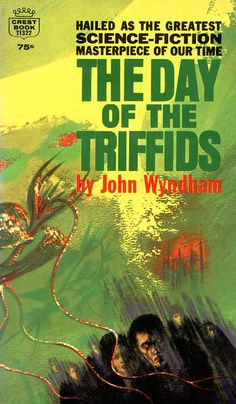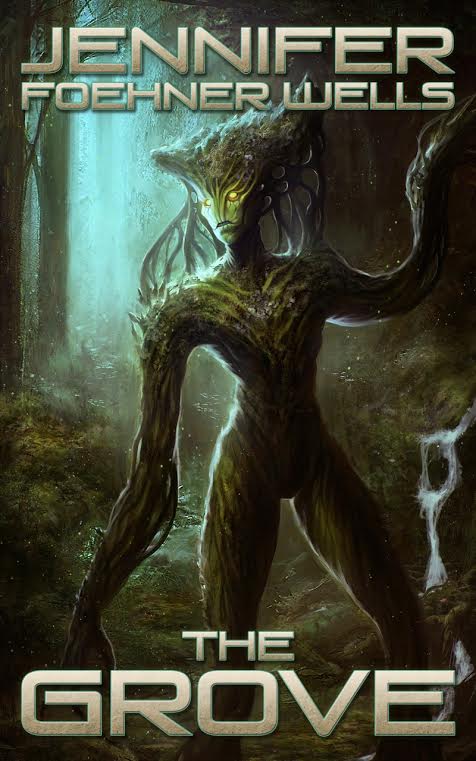This week’s Flashback Friday: The Day of the Triffids.
I’m happy to have bestselling author, Jennifer Foehner Wells, here for a guest post on how the book, The Day of the Triffids by John Wyndham influenced her as a writer.
As a child I had access to a friendly neighbor’s library that contained a lot of SF. I quickly discovered that SF was where my heart lay. One of the first books that I borrowed from her was a tome of Ray Bradbury short stories. The second was John Wyndham’s The Day of the Triffids.
 Few things have resonated with me in my lifetime of reading like Triffids did. It just stuck with me. As a child that was already enraptured with all things botanical, it captured my imagination like few things have before or since. I have thought of it often over the years and when I’ve mentioned it to others, I’ve found that few other people have actually read this book.
Few things have resonated with me in my lifetime of reading like Triffids did. It just stuck with me. As a child that was already enraptured with all things botanical, it captured my imagination like few things have before or since. I have thought of it often over the years and when I’ve mentioned it to others, I’ve found that few other people have actually read this book.
The funny thing is, I had no idea until recently that this book was considered a classic. Given my own proclivity toward easier, more entertaining reading, I had always assumed it was a bit of pulp that no one took seriously. Imagine my surprise at reading that Arthur C. Clark said it was, “an immortal story.”
This is one of those books that continued to echo in my mind long after I’d closed its musty cover. The images, themes, and concepts became a part of my SF genes. I saw its roots (pardon the pun) in a lot of the SF media I consumed. And, you know, I just released a novelette that features a walking, talking, sentient plant, so there you go. ;D
As I reread the book now, I can see how it was colored by its era—the cold war and gender issues really stick out. But many other things are quite universal. And there are some things that have struck me as I’ve seen them pop up in modern storytelling.
What are triffids? Why, they are tall, venomous AND carnivorous plants that can walk and make creepy rattling sounds. (I am NOT Groot.)
In this story, Triffids have become all the rage. After popping up in the Soviet Union, possibly as a genetic experiment gone wrong (remember—this was written during the cold war era), they quickly spread worldwide like semi-sentient kudzu. They’re widely cultivated because people find their extracted oil more valuable than other commercially available oils. Hm. I wonder if the Triffids enjoyed that aspect of their cultivation? Did anyone think to ask?
Enter our hero. Bill Mason is a biologist (or, ahem, triffidologist) who’s been in the hospital, convalescing from being splashed in the eyes with triffid poison—oh, did I forget to mention that they spray venom? Like Rick Grimes in The Walking Dead, Mason wakes up alone in an abandoned hospital. Mason unbandages his eyes to find that while he was convalescing, nearly everyone alive enjoyed watching a peculiar meteor shower, and as a result, everyone has gone blind.
In the days that follow, Mason encounters a few other sighted people. As they take stock, they discover to their horror that the triffids have begun to consume the defenseless blind. Mason quickly learns that they’ll have to fight not only the increasingly aggressive triffids for survival, but also the blind (and even sighted) people who have wildly different ideas about how to cope with the destruction of government and cultural structure.
It’s a fantastic post-apocalyptic tale that contains all the same elements that I like about zombie stories (the first of which, Night of the Living Dead, came over a decade later) and virus survival stories like the 2008 BBC series Survivors. The world goes mad almost overnight. Survival is hard. Finding pockets of other survivors is hard. And the triffids (or zombies or infected people) aren’t the only things you have to worry about. Survivors aren’t always working together in humanity’s best interests. It’s every man and woman for himself, often meaning that in the struggle to survive able men and women kill able men and women—instead of helping each other because resources are so hard to obtain. (I’ve always hated this trope, because I firmly believe 9/11 proved once and for all that humanity will band together in disasters to save others.)
One thing I loved about this novel (that is absent from a lot of books, tv shows, and movies in this genre) was that the protagonist is keenly interested in the science of these things. Like Robert Neville in Matheson’s classic I Am Legend, and Dr. Jeremy Stone in Crichton’s Andromeda Strain (both of which share some narrative elements with Triffid), Mason speculates upon and actively seeks to discover how the apocalypse came to happen and who is behind it (Mason thinks it’s a Russian genetic experiment gone wrong—but even as a young budding SF fan, I was always sure it was aliens!). And Mason is actively seeking the solution—a way to bring back balance (a way to eradicate the triffids, the cure, the antidote). That always resonated with me. I have always been the one to ask why and how. I like to know how things work. I am a problem solver.
In January of last year it was announced that Mike Newell who was at the helm for the film Harry Potter and the Goblet of Fire will create a Day of the Triffids movie (there have been several other films, radio plays, and tv series adapted from the novel) and with CG where it is these days, this could be the most spectacular version of this story yet. Until then? Pass me the controller. I’m itching to play Plants Vs Zombies….
 Jennifer Foehner Wells‘ most recent work is a novelette called The Grove.
Jennifer Foehner Wells‘ most recent work is a novelette called The Grove.
Hain, a sentient plant creature, defies instinct and genetic imperative by holding herself separate from the planet-encompassing vegetative super-intelligence known as the Mother.
Hain wants to explore the stars but when she finally encounters aliens, her destiny is forever changed.
You can check out The Grove and other works by Jennifer Foehner Wells here, on her Amazon Author page or on her website at:
Click here to read other Flashback Friday posts by other authors including Jean Walker, GG Silverman, Django Wexler, and more.


By the way, I’ve never read The Day of the Triffids, but after this post, I most certainly need to rectify that! 🙂
I love The Day of the Triffids. Along with The Stand it’s one of my top post-end of the world as we know it stories. It makes the reader wonder what they’d do in that situation, if they were one of the blind, or one of the sighted. I do feel as if it needed a follow up book. The ending leaves plenty open for that.
It think it’s very much like a zombie story. Like zombies the Triffids can seem initially not that big a threat. You can run faster than they can move. They aren’t very intelligent. They can’t use weapons except their natural ones. But like zombies they don’t need to stop and rest like humans, or find food and shelter. They just keep on coming and in the end can overwhelm with sheer numbers.
Now I need to reread it…
@Becky Black I’m a huge fan of zombies, so I definitely need to read this book. 🙂